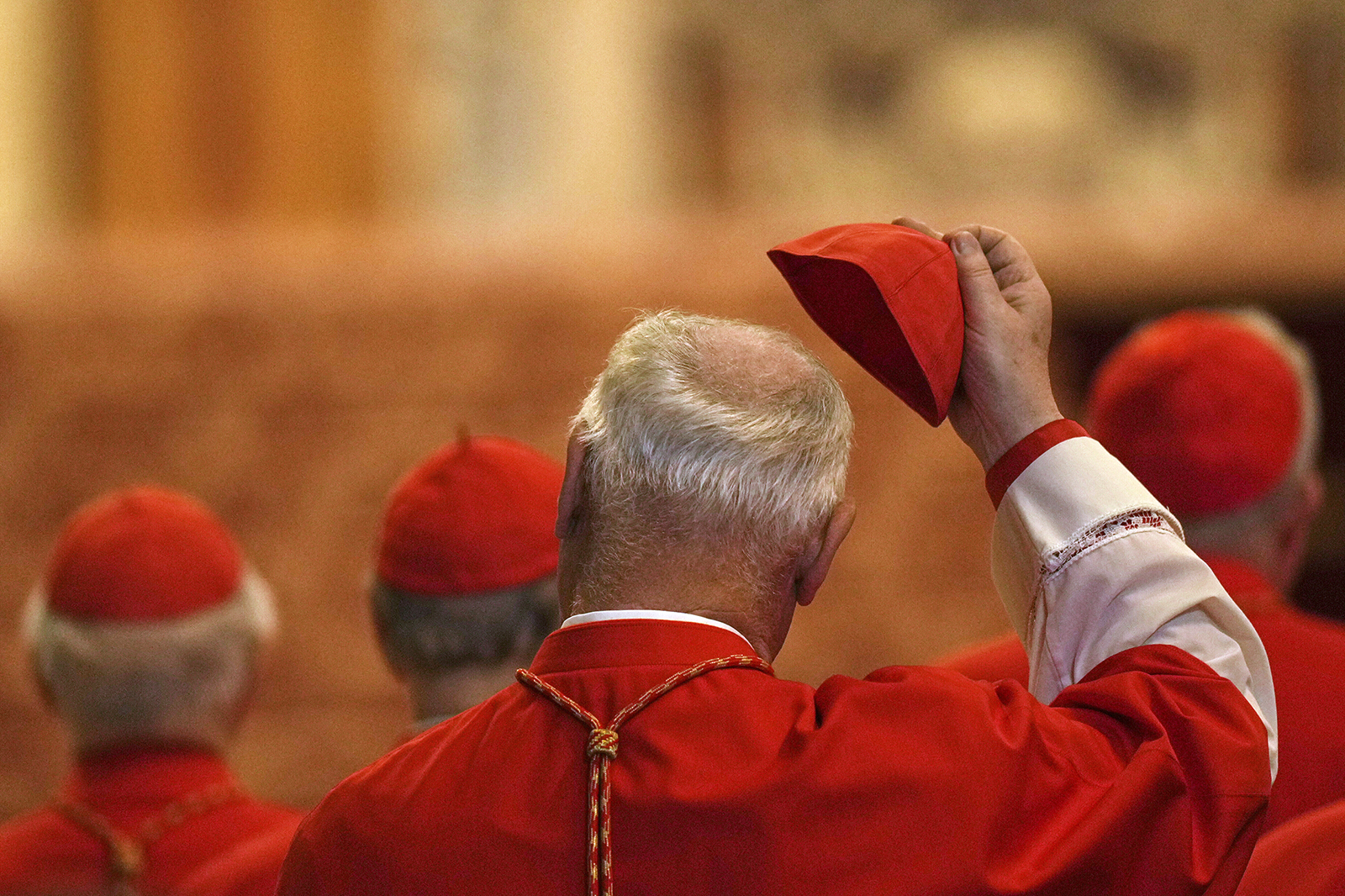
VATICAN CITY (RNS) — A diverse cast of cardinals gathering at the Vatican for Pope Francis’ funeral will soon turn to voting for his successor as head of the Catholic Church. Only a few are considered likely candidates for the papacy, or “papabile” in Italian.
Because of Francis’ elevation of prelates from the “peripheries,” many of the electors will have met only this week, while those who work in the Curia, the Vatican’s bureaucracy, know each other and many others besides. The magazine Cardinalis and the website Cardinal Report offer insight into every member of the College of Cardinals and where they stand on certain issues, but being recognizable will be an advantage in this conclave of strangers.
Some of the elements that cardinals look for in a pope never change: An impeccable background and strong leadership skills are a must, and candidates most likely have a mastery of languages and are well-traveled. But given their diverse backgrounds, not all cardinals’ priorities necessarily align with Western concerns.
Francis handpicked 80% of the cardinals who will vote on his successor, but it’s no guarantee the new pope will be like-minded: The conclave that elected Francis was filled with cardinals appointed by the relative conservatives Pope Benedict XVI and Pope John Paul II. While some cardinals want to see Francis’ work continued, others want to set the clock back to before Francis’ election in 2013. Still others will seek a middle ground.
Conservative option
In the last months of Francis’ papacy, his detractors were heard to say “Never again a Latin American. Never again a Jesuit,” a critique that saw him as too progressive on theological issues, including LGBTQ issues and women, and too unaligned with Western European priorities. Catholic conservatives condemned his provisional agreement with the People’s Republic of China, his restriction of the Latin Mass and his pragmatic approach to Catholic doctrine.
Cardinal Peter Erdo, 72
The archbishop of Budapest, Hungary, and the former head of the European Bishops’ Conference, Erdo has been a long-standing papal favorite. Made a cardinal in 2003 by Pope John Paul II, he occupied several influential positions in the Roman Curia under Francis, which makes him a versatile candidate capable of navigating the concerns of Europe and knowledgeable on Vatican affairs.
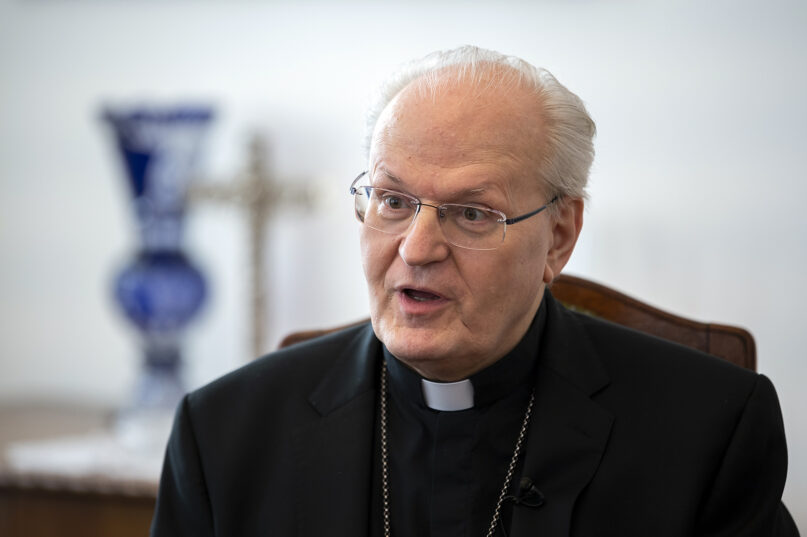
Cardinal Peter Erdo speaks during an interview with The Associated Press, in Budapest, on April 20, 2023. (AP Photo/Denes Erdos)
The cardinal has a good relationship with Hungarian Prime Minister Victor Orban, a main figure in the clash between East and West. Erdo has also cultivated relations with the doctrinally conservative Catholic hierarchy in Africa.
The media shy Erdo was endorsed by the late Cardinal George Pell, former economy czar at the Vatican and an influential prelate in conservative circles, who described Erdo as “a good canon lawyer who I would like to see having the top job one day.”
Despite his conservative credentials, Erdo has also spoken in favor of migrants and promoted interreligious dialogue.
Cardinal Albert Ranjith, 77
Elevated by Benedict in 2010, Ranjith has led the bishops’ conference in Sri Lanka, has occupied influential positions at the Vatican and is fluent in 10 languages. In his country he has been a prominent voice for Catholics, with a focus on young people and the poor.
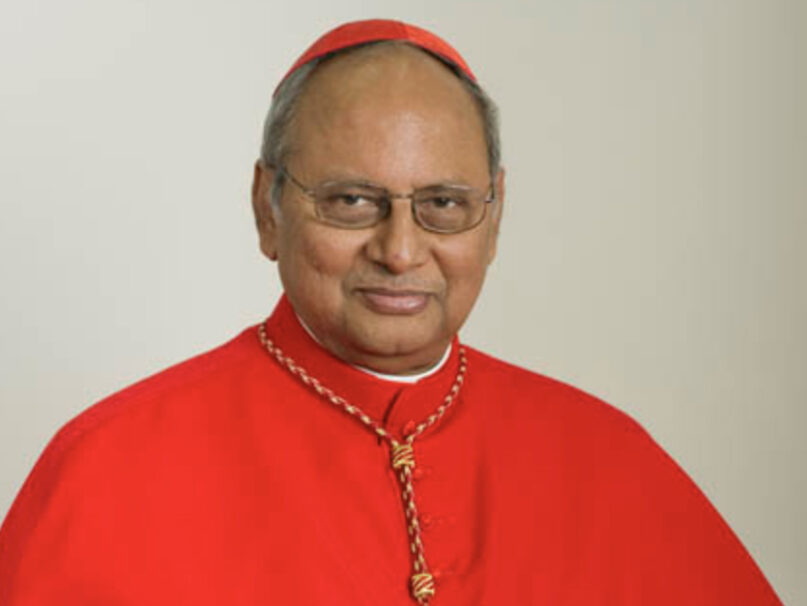
Cardinal Albert Ranjith. (Photo courtesy of Wikimedia/Creative Commons)
Ideologically, Ranjith upholds traditional family values, orthodox Catholic doctrine and priestly celibacy. He opposed legislation in his country allowing same-sex marriages and in 2024 he banned girls from serving at the altar, stating that it was a service meant to promote vocations for young men.
But from a social standpoint Ranjith has underlined the need to care for the poor and the marginalized and urged believers to stand up for social justice causes. He has been critical of capitalists and colonial attitudes toward the Global South. Sri Lanka is a Buddhist majority country with many Christians and Muslims cohabiting together, making Ranjith deft in navigating multicultural and interreligious relations.
Other possible candidates: Congolese Cardinal Fridolin Ambongo Besungu and Italian Cardinal Fernando Filoni, grand master of the Equestrian Order of the Holy Sepulchre and considered an expert on the Middle East.
A ‘transitional pope’
In a 2024 book, a Spanish journalist quoted Francis reflecting on Pope Benedict XVI’s election, saying: “After the revolution of John Paul II, who was a dynamic, very active pontiff, who took the initiative, who travelled … We needed a pope who could maintain a healthy balance, a transitional pope.” After the disruptive leadership of Francis, some prelates might seek a milder candidate who can signal continuity without too many surprises.
Cardinal Pietro Parolin, 70
A diplomat at heart, Parolin has traveled widely and met with foreign dignitaries, ambassadors and world leaders. As Vatican secretary of state, he took an active role in carrying out Francis’ policies and decisions. He is also highly recognizable for all cardinals, since they met with Parolin during their mandatory visits to the Vatican every five years. His election would be a sign the cardinals chose continuity.
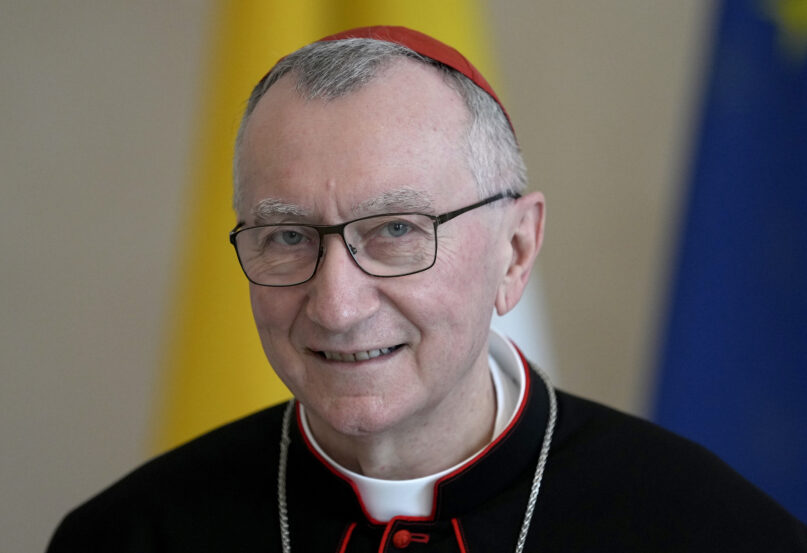
Vatican Secretary of State Cardinal Pietro Parolin smiles during a meeting at the Bellevue palace in Berlin on June 29, 2021. (AP Photo/Michael Sohn, File)
While in many ways a dream candidate, Parolin has suffered a few pitfalls. During Francis’ reforms of Vatican finances, his department was embroiled in a scandal that lost millions of euros, resulting in a trial of 10 Vatican officials and Italian businessmen and the stripping of Parolin’s office of its financial assets.
Some also view him negatively due to his active involvement in the drafting of a controversial and secretive deal with China on the ordination of bishops in 2018. While Vatican diplomats and Francis praised the move as an important overture toward the rising superpower, conservatives especially believed it compromised the church’s ability to call out human rights violations in the country.
Cardinal Anders Arborelius, 75
As bishop of Stockholm, Arborelius has had plenty of experience with representing the Catholic faith in a highly secularized environment. The first cardinal from Scandinavia, he has made engaging with Protestants — Lutherans especially — a key priority. This makes Arborelius stand out in a time when the church in Europe is faced with mounting challenges and struggles to find its identity while remaining true to doctrine.
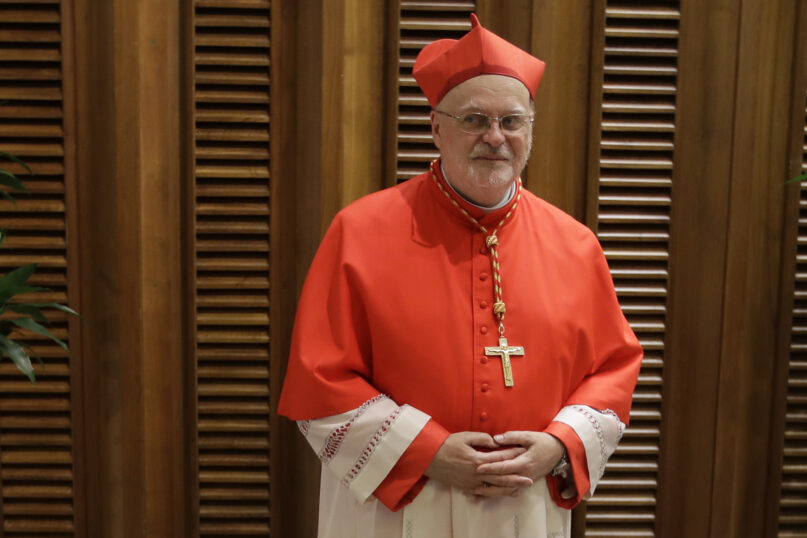
Cardinal Anders Arborelius at the Vatican, June 28, 2017. (AP Photo/Alessandra Tarantino)
While holding important Vatican positions under Francis, he has promoted the cause of immigrants and refugees and advocated for protection of the environment. When German bishops pushed for progressive reform in 2023, Arborelius urged them to obey Rome. In certain dioceses in Sweden, he has allowed faithful to continue practicing the Latin Rite.
He speaks many languages and has proved capable of overcoming the profound ruptures in the church, criticizing efforts to politicize the religious institution. Most of all, Arborelius is a cardinal dedicated to evangelizing in a world where Catholics are increasingly a minority, earning him the respect of Francis and many other prelates.
Other possible candidates: Cardinal Jean-Marc Aveline of Marseille, 66, and Cardinal Pierbattista Pizzaballa, patriarch of Jerusalem, 60, who, despite his youth, has caught the attention of conservative and progressive cardinals alike for his advocacy for peace in the Middle East.
Progressive favorites
For some cardinals, there is no going back after the profound changes and reforms that Francis ushered in. Many of Francis’ picks for the cardinalate are energetic leaders with a keen understanding of synodality and its potential to change power structures in the church. As populist conservative movements grow in the West, too, some prelates might be looking for a pope wo can stand up against the rising nationalist tide.
Cardinal Matteo Zuppi, 69
As head of the Italian Bishops’ Conference, Zuppi can count on support from the sizable Italian delegation at the conclave. He is also closely tied to the lay Catholic movement of St. Egidio and is known for his impressive pedigree in promoting peace and dialogue in global conflicts, beginning with his work in Mozambique in 1992.
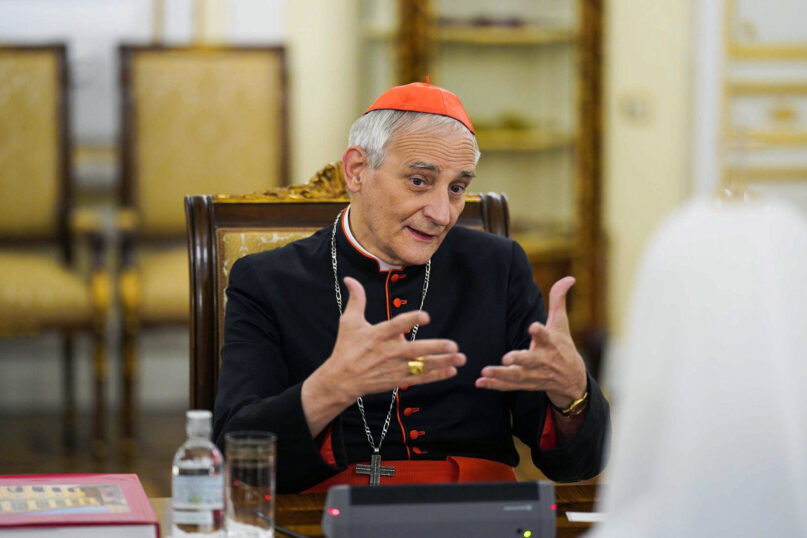
Cardinal Matteo Zuppi meets with Patriarch Kirill at the Patriarchal Residence in Danilov Monastery, in Moscow, June 29, 2023. (Photo by Moscow Patriarchate)
Zuppi’s profile as a peacemaker led Francis to tap him as his peace envoy on the Ukraine war. Zuppi has employed his knowledge of international diplomacy to meet with U.S., Russian and Chinese leaders, while arranging for the exchange of hostages, the respect of religious freedom and providing charitable support.
As archbishop of Bologna, Zuppi has emphasized the need to integrate migrants and refugees into society, welcome members of the LGBTQ community and engage in interreligious dialogue. He will be a progressive choice for cardinals who want to see the papacy extend its role in international conflict resolution.
Cardinal Luis Tagle, 67
Often called the “Asian Pope Francis,” the charismatic Filipino cardinal has been long-rumored as a favorite for the papacy. Not only would he represent the growing influence of the church in Asia, but he could energize evangelization for the whole church: His time as archbishop of Manila has led to growing vocations and an active participation of youth in Catholic life.
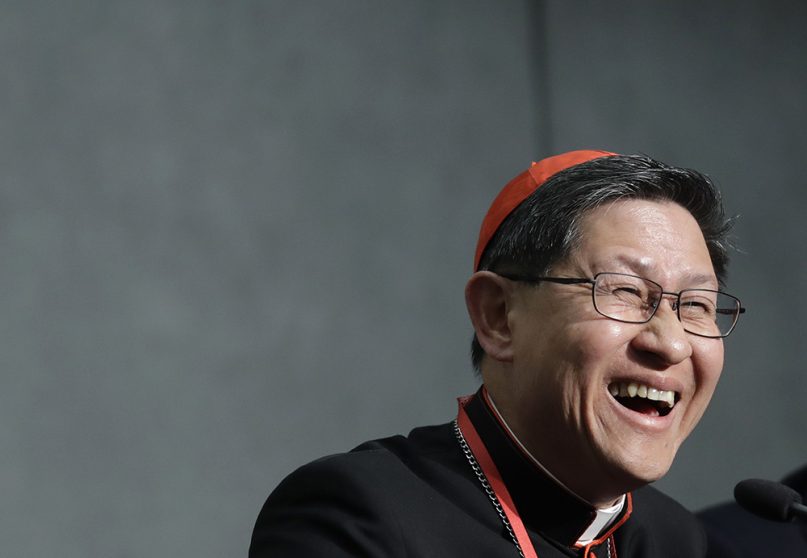
Cardinal Luis Tagle smiles during a news conference on the Synod at the Vatican on Oct. 23, 2018. (AP Photo/Alessandra Tarantino)
But if the cardinal has the charisma, he apparently lacks management skills. In 2015, Francis tapped Tagle to lead the global Catholic charity network Caritas before he was cast aside in a 2022 restructuring. He was then appointed to oversee the Vatican department on evangelization, but he was once again demoted when it was restructured.
Despite this seesaw leadership, he has clearly also gained the sympathies of many in Rome. He shares Francis’ pastoral approach to social questions, emphasizing a need to put human beings before rigid interpretations of doctrine.
Other possible candidates: Cardinal Mario Grech of Malta, 68, a key figure in Francis’ Synod on Synodality; Cardinal Joseph Tobin of Newark, New Jersey, 72; Cardinal Robert Prevost from Chicago, 69, who headed the Vatican department overseeing bishops. Many consider the election of a pope from the Anglosphere unlikely, given the powerful influence that the United States has in the world in political terms.
The dark horse: Cardinal Konrad Krajewski, 61, the pope’s almoner, charged with dispensing the pontiff’s charitable initiatives. The Polish prelate is known for having helped Italian transgender communities, restoring electrical power to a building for the homeless that had been shut off and visiting mass graves in Ukraine.
All of these prelates, even if they are not elected, will still play a crucial role as “kingmakers,” along with such proponents of continuing Pope Francis’ vision as Cardinals Jean-Claude Hollerich, Timothy Radcliffe and Michael Czerny. Cardinals Raymond Burke and Gerhard Mueller will likely lead the conservative ranks.
